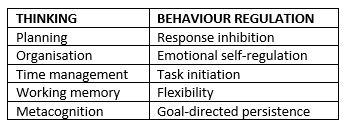Dear Parents
EXECUTIVE FUNCTIONING SKILLS
I am grateful to our Learning Support Co-ordinator, Marileen Harrod, who has assisted me in preparing this letter after a presentation to staff on the subject of Executive Functioning. Executive functioning skills are skills that some people seem to have naturally and in abundance so that they might think they do not need to be taught, practised or supervised. They are less exciting than solving a really challenging problem or writing a haunting, evocative piece of poetry. But these skills impact on everything we do and not developing them can lead to considerable stress, if not chaos.
Executive functioning skills fall into two categories and while we tend to merge them into the two headings, I am listing the ten skills below:

I know the above reads as quite a mouthful and in reality we lump them together as planning (thinking) and making things happen (behavior regulation) but breaking these down does enable us to see that a specific aspect can be a stumbling block. For instance, a boy plans well and follows his schedule responsibly but as soon as there is an unexpected change – a spontaneous family event, change of match day, change in homework – he is completely thrown.
So he is well planned and committed, provided everything goes to plan. If the plan gets broken, he can’t fix it so he has to learn to be flexible. Another boy is totally relieved that there is a change in plan so now he is absolved from meeting his other commitments. Over-flexible or some might say, a task-avoider. Similarly for children who have a slow output, struggle with handwriting or are easily distracted, executive functioning is very challenging but for such children developing these skills is even more important because these skills assist in managing a boy’s other difficulties.
Asking these four questions will assist him in using these skills properly:
What needs doing and by when?
Preparing for a test, final practice of an oral, music exam, packing dishes ….
What do I need?
What books do I need to bring home? Do I need my geometry set? ….
What are the steps needed to achieve the above?
Packing correctly – both coming to and leaving school. This is books, stationery, sports kit, musical instrument and so on. I see many boys going home groaning under the weight of a full desk of books rather than taking home only what is needed ….
What will being done look like?
I have packed everything I need, I understand the four experiments for the test ….
The advantage of the weekly planner is that work and preparation are broken up into sizeable chunks even if it is completed in the homework period. If there is a sudden change then that “chunk” is moved to a different time of day – and with this in place he must manage himself to do all these things, regulating his behavior and delaying the things he would possibly much rather be doing. He learns to use the planner and look at the overview – will it work? – and then reflects – did it work? If there were problems, how does he avoid them in future? This meta-cognitive skill involves consciously looking over his planning and behaviour to ensure he has used his executive functioning skills effectively.
As the adults we need to help our boys do this.
- Check that everything is on their planner – music lessons, cricket match as well as homework. I would include household chores – he must have at least a few a week however simple or quick to complete.
- Then check that it is being carried out, has the work been done, does he have the correct items packed for the next school day? It does not help if we pack for them – a chart on the wall of what is needed for each day is a great help.
Our role as adults is to monitor and help, not do. If a teacher tells a boy every Tuesday, 5th period that he must go to music in the 6th period, he never learns to remember. But if we monitor whether he gets up at the start of the 6th period and if he doesn’t remind him and then help him to find a way to remember in future, he learns to take responsibility for his attendance.
For busy teachers and parents it is often much easier to do as much as we can for our boys then we know it is done and it takes half the time – but in doing so we do not empower them. Boys can be quite exhausting in terms of avoiding developing these skills or not wanting to use them but if we persevere and train them we will empower them.
Kind regards
GREG BROWN
HEADMASTER |